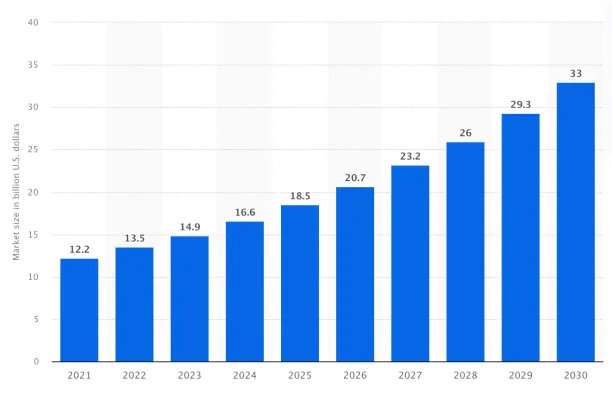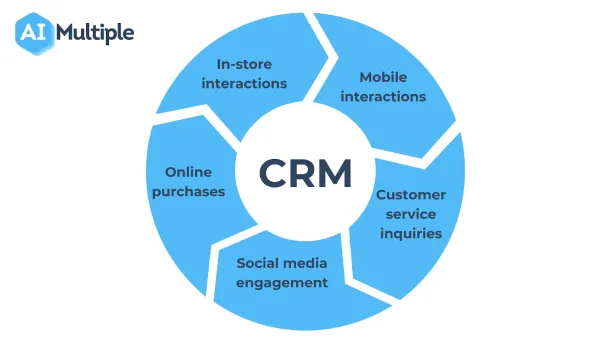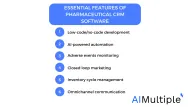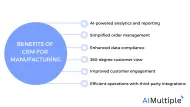Top 10 Retail CRM Software in 2024
Customer data management is especially challenging for retailers due to the ever-increasing and evolving customer demands. Thus, successful retail operations require the capacity to effectively manage huge amounts of customer data. Research shows that retail companies implement automated solutions to increase productivity, enhance revenue streams, and reduce costs.1 Indeed, the global retail automation market is projected to exceed $30 billion by 2030, illustrating this upward trend (See Figure 1).

Source: Statista
Figure 1. Global retail business automation market size in 2021 and with projections till 2030.
One of the applications of automation in the retail industry is Customer Relationship Management (CRM) software. However, with an abundance of options on the market and various business factors to consider, finding the right CRM solution can be challenging. To remedy that, this article:
- Explains the usage of AI-enabled CRM software in the retail industry
- Presents the CRM software capabilities in retail
- Examines the best retail CRM software in the market to help businesses in finding the right retail CRM software that satisfies their needs.
What is retail CRM software?

A retail Customer Relationship Management (CRM) software is a specialized tool that helps retail businesses manage and analyze their interactions with current and potential customers. It collects and organizes a wealth of customer data from various touch points such as:
- in-store interactions
- online purchases
- customer service inquiries
- social media engagement
- mobile interactions
in one centralized location.
The primary goal of a robust retail CRM software is to create a comprehensive view of each customer. This allows retailers to personalize their marketing efforts, improve customer service, and ultimately, increase customer loyalty and sales.
Top 10 retail CRM tools
We narrowed our vendor list based on some criteria. We used the number of B2B reviews and employees of a company to estimate its market presence because these criteria are public and verifiable.
Therefore, we set certain limits to focus our work on top companies in terms of market presence, selecting firms with:
- 500+ employees
- 150+ reviews on review platforms including G2, Trustradius, Capterra
- at least one Fortune 500 reference
Here is our analysis of the top vendors providing Customer Relationship Management Software in the retail industry. We have analyzed the vendors in terms of market presence and commercials (e.g., free trial & price). You can sort Table 1, for example, by the ratings.
| Vendor Name | Employee size | Reviews | Pricing options | Free trial | Ratings* | Deployment |
|---|---|---|---|---|---|---|
| Pipedrive | 950 | 1,600 | Starts from $14.90 / month per user | ✅ | 4.2/5 | Cloud Mobile Desktop |
| Salesforce Sales Cloud*** | 75,000 | 14,000 | Starts from $25 / month billed annually | ✅ | 4.3/5 | Cloud Mobile |
| HubSpot Sales Hub*** | 8,000 | 10,000 | Starts from $50 / month for two users | ✅ | 4.4/5 | Cloud Mobile |
| Zoho CRM | 5,000 | 2,400 | Starts from $14 / month per user | ✅ | 4/5 | Cloud |
| ActiveCampaign for Sales*** | 830 | 1,350 | Starts from $19 / month per user billed annually | ✅ | 4.5/5 | Cloud Mobile Desktop |
| Freshsales*** | 7,500 | 1,050 | Starts from $15** / month per user | ✅ | 4.5/5 | Cloud Mobile Desktop |
| Zendesk Sell | 6,300 | 600 | Starts from $19** / month per user | ✅ | 4.2/5 | Cloud Mobile |
| monday.com CRM | 1747 | 535 | Starts from $10 / month per user | ✅ | 4.7/5 | Cloud Mobile Desktop |
| Creatio | 575 | 225 | Starts from $25 / month per user | ✅ | 4.6/5 | Cloud Mobile Desktop |
| Vymo | 500 | 155 | Not provided | ✖️ | 4.6/5 | Cloud Mobile |
| Redtail CRM | 85 | 130 | Starts from $99 / month per data base | ✅ | 4.3/5 | Cloud Mobile Desktop |
Disclaimer: With sponsors at the top, other vendors are sorted by the total number of reviews in descending order.
Here, we also analyzed the capabilities and features of the retail CRM software. As all vendors offer order & delivery management and reporting & analytics capabilities, we didn’t include these in the table. You can sort Table 2, for example, by the no-code capabilities.
| Vendor | Real-time monitoring | 360° customer view | Predictive lead scoring | No code capabilities | Calendar | Customer support | Quality of support* |
|---|---|---|---|---|---|---|---|
| Pipedrive | ✅ | ✖️ | ✅ | ✅ | ✅ | Phone Support 24/7 (Live Rep) Chat | 8.3/10 |
| Salesforce Sales Cloud*** | ✅ | ✅ | ✅ | ✖️ | ✅ | Phone Support Chat | 7.9/10 |
| HubSpot Sales Hub*** | ✅ | Not provided | ✅ | Not provided | N/A / syncs with other tools | Phone Support 24/7 (Live Rep) | 8.6/10 |
| Zoho CRM | ✅ | ✅ | ✖️ | Not provided | ✅ | Phone Support 24/7 (Live Rep) Chat | 7.5/10 |
| ActiveCampaign for Sales*** | ✅ | ✅ | ✅ | ✖️ | N/A / syncs with other tools | Phone Support Chat | 8.6/10 |
| Freshsales*** | ✅ | ✅ | ✅ | ✖️ | N/A / syncs with other tools | Phone Support 24/7 (Live Rep) Chat | 8.9/10 |
| Zendesk Sell | ✖️ | ✅ | ✅ | ✖️ | ✅ | Phone Support 24/7 (Live Rep) Chat | 8.5/10 |
| monday.com CRM | ✅ | ✅ | ✅ | ✅ | ✅ | 24/7 (Live Rep) Chat | 8.8/10 |
| Creatio | ✅ | ✅ | ✅ | ✅ | ✅ | Phone Support 24/7 (Live Rep) Chat | 9.1/10 |
| Vymo | ✅ | ✅ | ✅ | ✖️ | ✅ | Phone Support | 8.8/10 |
| Redtail CRM | ✖️ | ✖️ | ✖️ | ✖️ | ✅ | Phone Support | 8.9/10 |
*Based on G2 reviews
**This price is relevant when paid annually. If a company chooses a monthly subscription, then the price is $25 / month per user for Zendesk Sell and $18 / month for Freshsales.
*** Companies that include CRM as part of a broader set of offerings typically have a larger workforce or receive more evaluations than businesses focusing exclusively on providing CRM services.
9 retail CRM software capabilities to consider while narrowing down your options
1- Order & delivery management
Retail CRM software can automate the entire order and delivery process. This involves taking customer orders, following them through the fulfillment process, and ensuring they are delivered on schedule. Customer satisfaction increases due to reduced errors, increased efficiency, and prompt delivery.
2- Deployment
This refers to how CRM software is utilized within a business’s operations. It can be set up as a hybrid model, on-premises, or in the cloud (SaaS). Each model has advantages and disadvantages specific to it. For instance, on-premise CRM can provide more control and customization possibilities, whereas a cloud-based CRM platform is often more scalable and costs less upfront.
3- Real-time monitoring
This feature enables retailers to monitor vital real-time inventory levels, customer interactions, and sales data. With real-time monitoring, a company can respond quickly to changes, such as refilling a popular item or resolving a consumer query. This is critical in connecting CRM platforms with other systems, such as inventory management or point-of-sale (POS) systems.
For instance, a grocery store could use a CRM system to instantly see when a popular product is running low and needs to be restocked.
4- 360° customer view
Retailers can gather and analyze consumer data from all touch points, including online, in-store, and mobile, with a 360° customer view. This provides a comprehensive insight into the consumer’s preferences and behavior, allowing for targeted marketing and better customer service.
For instance, a furniture retailer could use CRM to see that a customer first visited their website, then visited their physical store, and finally made a purchase through their mobile app.
5- Predictive lead scoring
This capability employs artificial intelligence (AI) and machine learning to predict the possibility of a lead becoming a customer based on their purchase history or behavior. It assists sales teams in focusing their efforts on the most promising leads.
6- No-code capabilities
Retail CRM software often includes features that allow users to customize the tool without needing to write code. No-code CRM platforms help employees use the CRM software more confidently and with ease.
7- Reporting & analytics
CRM software can gather vast quantities of data, which can then be examined to yield valuable insights. Businesses can monitor essential metrics and KPIs using the reporting function, and analytics can find trends, patterns, and potential opportunities.
8- Calendar
The calendar feature in a CRM application helps schedule and track all events, tasks, and activities. This can range from monitoring sales appointments to organizing marketing campaigns or customer support schedules. It’s vital to ensure that nothing goes through the holes and that every customer engagement is timely.
9- Customer support
CRM systems often include a customer support module that may handle customer inquiries, manage support tickets, and provide a platform for communication between the customer and the support team. This speeds up response times, addresses issues more quickly, and improves customer experience.
For those interested, here is our data-driven list of CRM software.
Transparency statement:
AIMultiple serves numerous emerging tech companies which received links from this research.
If you need help in your vendor selection process, we can help:
External links
- 1. “Business benefits of AI according to retail executives worldwide in 2023“. Statista. Retrieved May 18, 2023.

Cem has been the principal analyst at AIMultiple since 2017. AIMultiple informs hundreds of thousands of businesses (as per similarWeb) including 60% of Fortune 500 every month.
Cem's work has been cited by leading global publications including Business Insider, Forbes, Washington Post, global firms like Deloitte, HPE, NGOs like World Economic Forum and supranational organizations like European Commission. You can see more reputable companies and media that referenced AIMultiple.
Throughout his career, Cem served as a tech consultant, tech buyer and tech entrepreneur. He advised businesses on their enterprise software, automation, cloud, AI / ML and other technology related decisions at McKinsey & Company and Altman Solon for more than a decade. He also published a McKinsey report on digitalization.
He led technology strategy and procurement of a telco while reporting to the CEO. He has also led commercial growth of deep tech company Hypatos that reached a 7 digit annual recurring revenue and a 9 digit valuation from 0 within 2 years. Cem's work in Hypatos was covered by leading technology publications like TechCrunch and Business Insider.
Cem regularly speaks at international technology conferences. He graduated from Bogazici University as a computer engineer and holds an MBA from Columbia Business School.
To stay up-to-date on B2B tech & accelerate your enterprise:
Follow on

Comments
Your email address will not be published. All fields are required.